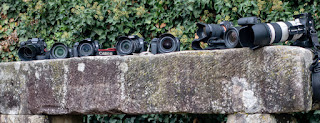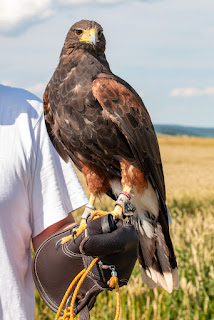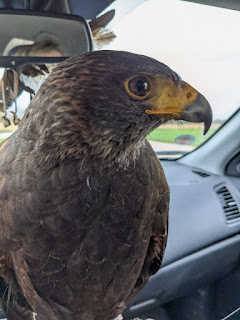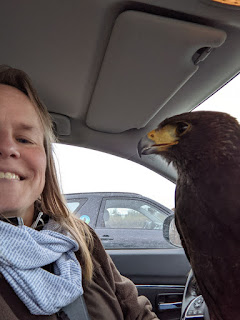Vor Kurzem hat jemand in einer Facebook-Gruppe für Falkner eine Frage gepostet:
„Gäbe es
zufällig Falkner aus Bayern, deren Tiere man für ein Shooting buchen könnte?“
Ich bin
Amerikanerin und meine Muttersprache ist Englisch. „Shooting“ ist ein englisches
Wort und bedeutet „Schießerei“. Also, nein, ich bin mir sicher, dass keine
Falkner – egal wo – würden zulassen, dass ihre Greifvögel und Eulen für eine Schießerei gebucht
werden.
Wenn ich meinen Eltern eine E-Mail mit dem Betreff „Shooting at a falconry center“ schreiben würde, würden sie schockiert weiterlesen, um zu schauen wie viele Menschen und Tiere erschossen wurden. Es passiert immer wieder in den USA. Ok, eher in Schulen und Gebetshäusern als in Falknereien, aber du verstehst, was ich meine.
 |
| Das könnte ein Fotoshooting sein. |
 |
| Wir hören "Shooting" und unser Kopfkino fängt hier an. |
Aber jetzt sage ich es, meine liebe deutsche LeserInnen…bitte hör auf, „Shooting“ zu sagen und zu schreiben. Es ist „photo shooting“ oder „Fotoshooting“. Ganz ehrlich.
Stell dir
vor, wir Amerikaner fangen an, das deutsche Wort „Schießerei“ zu benutzen, weil Fremdwörter
cool sind:
- „Are there any dog owners out there who book their
pets for a Schießerei? I need some practice!”
- “There was a Schießerei before my friend’s wedding
last weekend. It was so
nice!”
- „When we arrived at Ludwigsburg Castle for our tour,
there was Schießerei going on!”
- “I’m available for Schießereien! Click here for my prices.”
 |
| Das könnte ein Fotoshooting sein, aber kein Shooting! |
- "How many pictures did you shoot today?" (Fotos machen)
- "Oh, that's a good shot!"*
- "I got a lucky shot of a falcon the other day." (Foto)
- "How long did the shoot take yesterday?" (Foto- oder Filmentermin)
Aber schau mal. Diese zwei Sätze bedeuten überhaupt nicht das Gleiche!
- “No one was injured during the shooting yesterday.” (Amoklauf/Schießerei)
- "No one was injured during the shoot yesterday.” (Film/Fotographie)
 |
| Oder als Verb: In this photo I am shooting at a target. |
- Handy (für Amis ist das ein adjektiv und bedeutet "griffbereit")
- Public Viewing (vor einer Beerdigung, wenn der Sarg offen liegt, damit man dem Verstorbenen seine letzte Ehre erweisen kann)
- Backside (Po; für "Rückseite" braucht man ein Leerzeichen - "back side")
- Body bag (Leichensack)
- Football (amerikanischer Fußball, NFL)
- Foosball, "Fußball" (Tischkicker)


